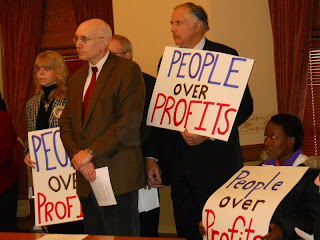 |
| Wisconsin citizens oppose Special Session bill. |
On Tuesday, the Wisconsin Legislature convened a special session to discuss a bill that would strengthen legal protections for corporations that injure or kill workers, consumers or innocent bystanders.
“The special session on job creation is being used as a cloak for corporate interests to achieve a long-desired goal – to deny meaningful access to the courts for workers who are injured or killed on the job, as well as consumers and other victims who have been harmed,” said brother Phil Neuenfeldt, president of Wisconsin's AFL-CIO.
Perhaps the gravest threat to Wisconsin's middle class is Rep. Robin Vos's proposed right-to-work (for LESS) bill. We're seeing these crop up all over the country -- in Indiana, in New Hampshire, in Maine and in Missouri, to name just a few. It isn't a coincidence. Lowering wages has long been a goal of powerful corporations and billionaires in this country, and that's exactly why we call them right-to-work (for LESS) laws. Workers in the 22 states with these anti-union laws on the books earn on average $5,500 a year less than in the rest of the U.S.
The corporations and billionaires like David Koch have funded a vast, well-coordinated network of think tanks, business groups and phony grass-roots campaigns to promote right-to-work (for LESS) laws. They're the same people who told us jobs would be created by NAFTA and tax cuts for the wealthy and no-strings-attached Wall Street bailouts.
Right-to-work (for LESS) weakens unions by make it illegal for companies to require workers to pay union dues. Unions would still have the obligation and the cost to negotiate and represent every worker, including freeloaders, in their bargaining unit. It's a classic divide-and-conquer tactic that strengthens the company's hand at the bargaining table.
Here's what happens in states where the workers have the right to work for less:
- Fewer people have health care and the taxpayers pay substantially more to support the state's Medicaid program.
- The rate of workplace deaths is 53 percent higher.
- The poverty rate will rise; it's 19 percent in right-to-work (for LESS) states, compared with 16.6 percent in other states.
